POETRY
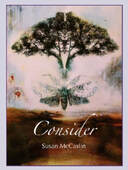
CONSIDER
Aeolus House, September 2023
ISBN: 978-1-987872-54-4
Blurbs:
“Susan McCaslin’s splendid new collection Consider calls her readers to consider the simpler forms of life as opportunities for enhanced perception. Led and accompanied by the saints, visionaries, and prophets, this volume moves from the humblest to the grandest considering: the vision of Dante’s Beatrice: “who set her gaze on point zero…// where the many and the one/ sing union.”
— M. Travis Lane
“After reading these poems, you’ll never think of the word ‘consider’ in the same way again. Picture a magnolia tree in bloom, ablaze in radiant white, and everything in and around the tree opening, flowering. You’ll never look on Jesus the same way either, for he is not only a teacher but also a poet.”
— J.S. Porter
“To read Consider is to part the curtains of the dreamworld that Susan McCaslin explores so deftly, so richly. Isis wraps her beloved in white feathers, Jesus shimmers on a wall in the early morning, and two goldfinches, found under a table, are breathed into flight. Her deeply thoughtful poetry reveals that we are all enigmas that can be puzzled open, each of us capable of transformation.”
— Anne Simpson
“McCaslin’s Consider – a book of unusual and revivifying tenderness –is an homage to a beloved teacher and guide, the poet Robin Blaser (d 2007). From grieving mother-whales, to the ancient manuscripts of Nag Hammadi, to the fragrance of the cedar forest, to the “spiral-knotted galaxy…. half-shadowed half sun-lit,” McCaslin’s considerations “slip past systems” to restore and repair our desire to love.”
— Sharon Thesen
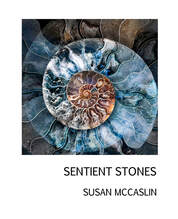
SENTIENT STONES
Raven Chapbooks, 2023
https://www.ravenchapbooks.ca/sentient-stones/
ISBN: 978-1-7781603-3-2
"The icon that centres McCaslin’s vision and provides the cover art for Sentient Stones is an ammonite, a fossil that is curved like a ram’s horn and rather magnificently named after an Egyptian supreme god, Ammon Ra. Here the coinage “sentient circle” that echoes the title informs a branching of themes that carries not only the sense of an inherent consciousness and spirituality in inert matter such as ammonites and stones but also embraces the idea of a circle of life and death to rebirth."
-- Excerpt from review by gillian harding-russell in The British Columbia Review
Raven Chapbooks, 2023
https://www.ravenchapbooks.ca/sentient-stones/
ISBN: 978-1-7781603-3-2
"The icon that centres McCaslin’s vision and provides the cover art for Sentient Stones is an ammonite, a fossil that is curved like a ram’s horn and rather magnificently named after an Egyptian supreme god, Ammon Ra. Here the coinage “sentient circle” that echoes the title informs a branching of themes that carries not only the sense of an inherent consciousness and spirituality in inert matter such as ammonites and stones but also embraces the idea of a circle of life and death to rebirth."
-- Excerpt from review by gillian harding-russell in The British Columbia Review
COSMIC EGG
The Alfred Gustav Poetry Series, June 2021. Ed. David Zieroth. North Vancouver, B.C.
(Chapbook)
Cosmic Egg is a sequence of poems that traces the evolution of the poet’s relation to the figure of Jesus through childhood to adulthood and later life where literalism, dogmas, beliefs, and creeds have fallen away and the figure of the human, visionary, activist, poet Jesus remains: “Age 30. I wake from a dream into a lucid dream:/ Christ shimmers on the wall above my bed/arms outstretched a Tree of Life.”
The Alfred Gustav Poetry Series, June 2021. Ed. David Zieroth. North Vancouver, B.C.
(Chapbook)
Cosmic Egg is a sequence of poems that traces the evolution of the poet’s relation to the figure of Jesus through childhood to adulthood and later life where literalism, dogmas, beliefs, and creeds have fallen away and the figure of the human, visionary, activist, poet Jesus remains: “Age 30. I wake from a dream into a lucid dream:/ Christ shimmers on the wall above my bed/arms outstretched a Tree of Life.”
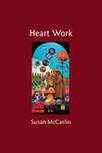
HEART WORK
Ekstasis Editions, 2020
http://www.ekstasiseditions.com
ISBN: 978-1-77171-402-0
Heart Work explores the regions of “the educated heart” where heart and mind, feeling and thinking conjoin. Hildegard of Bingen, Julian of Norwich, and John Keats whirl together in liminal and earthy places where beliefs and concepts open to unknowing and mystery. Her breathtaking union of minimalist, Zen-like poems paired with her husband’s powerful photos in “Cariboo Fires, 2017,” and her sequence on living during the pandemic, “Corona Corona,” offer hope by tying the cosmic to the particular and the everyday.
Blurbs:
This luminous book is a poetic mandala, a circle of compassion that embraces the planet, and illuminates the particulars of sparrow, snail and spider. Susan McCaslin follows the poet’s vocation to “dream, receive, and chant the broken world.” The poems speak most movingly to our times, addressing coronavirus, and lamenting a beloved forest region devastated by wildfire. These are poems that soar with the kite bird “disappearing into the wind,” but dwell also with the lowly, the “monkish cow” who “sentinels a spindly grove.” They bring comfort in the original sense of the word: that which gives strength.
Hildegard of Bingen, Keats, and Julian of Norwich enter Susan McCaslin’s reflections to enrich our sense of these times and their meaning. McCaslin has evidently lived with the mystics’ writings for a long time and they appear here, not as though they are of the past, but as though they are presences who have been with us all along. One feels that each of the three visionaries would have treasured this exquisite book, would have welcomed McCaslin into their companionship, and joined with the reader in heartfelt grief and praise as the poet honours our planet in all its beauty, tragedy and hope.
— Barbara Colebrook Peace
Susan McCaslin calls us away from postmodern vacuity, calls us away to behold again the ancient and the timeless, even in the new.This book is a lovely wander, with stops to visit with a wise old woman and an ecstatic young man, on a road that leads through a wildfire-ravaged landscape to find flashes of persistent life and joy even in the depths of our various global maladies. The poems in Heart Work connect us, through an experienced poet’s skill, to other times and other lives. Each small window into the past and the poetic helps us see more deeply that which is universal, and, as Keats says, “take part in its existence.”
— Diane Tucker
Each reader will take away her own treasure from Heart Work. For me, the Keatsian exploration of letter-snippet and meditative-response is particularly thrilling. McCaslin in this suite of poems grounds Beauty and Truth in the spider “flirting her silk/by the window” and the Northern Flicker “slow-timing time…with its red cap and/spotted vest.” Nothing is abstract in these poems; everything flickers, and glows in luminous details and particularities.
— J.S. Porter
Ekstasis Editions, 2020
http://www.ekstasiseditions.com
ISBN: 978-1-77171-402-0
Heart Work explores the regions of “the educated heart” where heart and mind, feeling and thinking conjoin. Hildegard of Bingen, Julian of Norwich, and John Keats whirl together in liminal and earthy places where beliefs and concepts open to unknowing and mystery. Her breathtaking union of minimalist, Zen-like poems paired with her husband’s powerful photos in “Cariboo Fires, 2017,” and her sequence on living during the pandemic, “Corona Corona,” offer hope by tying the cosmic to the particular and the everyday.
Blurbs:
This luminous book is a poetic mandala, a circle of compassion that embraces the planet, and illuminates the particulars of sparrow, snail and spider. Susan McCaslin follows the poet’s vocation to “dream, receive, and chant the broken world.” The poems speak most movingly to our times, addressing coronavirus, and lamenting a beloved forest region devastated by wildfire. These are poems that soar with the kite bird “disappearing into the wind,” but dwell also with the lowly, the “monkish cow” who “sentinels a spindly grove.” They bring comfort in the original sense of the word: that which gives strength.
Hildegard of Bingen, Keats, and Julian of Norwich enter Susan McCaslin’s reflections to enrich our sense of these times and their meaning. McCaslin has evidently lived with the mystics’ writings for a long time and they appear here, not as though they are of the past, but as though they are presences who have been with us all along. One feels that each of the three visionaries would have treasured this exquisite book, would have welcomed McCaslin into their companionship, and joined with the reader in heartfelt grief and praise as the poet honours our planet in all its beauty, tragedy and hope.
— Barbara Colebrook Peace
Susan McCaslin calls us away from postmodern vacuity, calls us away to behold again the ancient and the timeless, even in the new.This book is a lovely wander, with stops to visit with a wise old woman and an ecstatic young man, on a road that leads through a wildfire-ravaged landscape to find flashes of persistent life and joy even in the depths of our various global maladies. The poems in Heart Work connect us, through an experienced poet’s skill, to other times and other lives. Each small window into the past and the poetic helps us see more deeply that which is universal, and, as Keats says, “take part in its existence.”
— Diane Tucker
Each reader will take away her own treasure from Heart Work. For me, the Keatsian exploration of letter-snippet and meditative-response is particularly thrilling. McCaslin in this suite of poems grounds Beauty and Truth in the spider “flirting her silk/by the window” and the Northern Flicker “slow-timing time…with its red cap and/spotted vest.” Nothing is abstract in these poems; everything flickers, and glows in luminous details and particularities.
— J.S. Porter
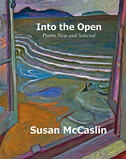
INTO THE OPEN: NEW AND SELECTED POEMS
Inanna Publications, 2017
https://www.inanna.ca/catalog/open-new-and-selected/
ISBN: 978-1-77133-465-5
Into the Open: Poems New and Selected is both a compendium and compression of the best and most representative of Susan McCaslin's poetry over nearly five decades. In addition, it showcases new work. The explorations of Into the Open begin with McCaslin's intense early interest in mystical Christianity, but expand to include global wisdom traditions from cultures east and west. Her work does not advocate for a particular system of belief, but exemplifies the open-ended probings of an inquiring mind. A selection of her new work in a powerful sequence called Lineage takes up some of her earlier themes but pushes them into new arenas, addressing questions of how to age into elder-dom; how to take one's place with humility and gratitude in a world fraught with pain and loss; how to remain open to wonder. In the words of her editor Katerina Fretwell, "Selecting from Susan McCaslin's eighteen-book oeuvre Into the Open has been a pilgrimage through her poetic and spiritual evolution. Her visionary poetscapes conjure William Blake, Thomas Merton, Greco-Roman mythology, angels, the Canadian mystic Olga Park, John of Patmos, Teresa of Avila, Henry Vaughan, Lao Tzu, Han Shan, Mary Magdalene and other unitive mystics of many cultures, faiths and eras. Such diversity suggests the range and reach of McCaslin's work. Here is a poet at the peak of her powers."
Blurbs:
"It’s not easy to be a poet of the calibre of Susan McCaslin. You need to see an object, or a being, in its fullness, but also its surround, its interconnections and interdependencies. You need to know words intimately, their textures and sounds; you need to know birds and trees and dogs; you need to be able to enter lives foreign to yours as if they were your own. This is one of McCaslin’s great talents: to enter another life, or life form, and re-animate it."
— J.S. Porter, in Canadian Woman Studies, Vol. 32
"Susan McCaslin’s Into the Open is an outstanding achievement comprising over forty years’ worth of work. It is nothing short of astonishing in its breadth and depth, its sheer sophistication of form, language and theme. The book brings together poems from McCaslin’s thirteen previous collections plus a selection from five early chapbooks and thirty new poems. The development of her artistry is a pleasure to behold, her voice confident, compassionate and clear, and always lit with the energy caught in the last two lines of this incredible book: “Nothing divine charges a fee/Everything is charged with love.” If you read only one book of poetry this year, read this one.”
— Eva Tihanyi, author of The Largeness of Rescue and Flying Underwater: Poems New and Selected
Into The Open, Susan McCaslin’s long awaited New and Selected Poems is a marvelous compendium of her singular poetic and spiritual journey spanning four decades of poetry-making and eighteen books. A visionary and mystic, a rarity in today’s world, McCaslin blazes a luminous path ranging from the Divine Feminine and Ars Poetica to such pressing imperatives as stewardship of the earth and social justice in a troubled world. I know of few poets who have forayed with such power and grace (not to mention courage) into the blinding mysteries of the human heart. Her collection radiates wonder, gratitude & loving-kindness—a feast for mind and spirit to be pondered and treasured.”
— James Clarke, author of seventeen volumes of poetry including The Juried Heart
“Into the Open reveals poems charged with grounded aperçus, lightning landed, and vision realized in “kin-ship” along the poet’s uncommon daily round. Here’s a vibrancy in and beyond the senses, pulsating across decades: an essential, timeless and timely book. Read Susan McCaslin’s eloquent articulation of a mystical, creative life and be changed, be charged and inspired.”
— Penn Kemp, poet and playwright; author of Barbaric Cultural Practice
Inanna Publications, 2017
https://www.inanna.ca/catalog/open-new-and-selected/
ISBN: 978-1-77133-465-5
Into the Open: Poems New and Selected is both a compendium and compression of the best and most representative of Susan McCaslin's poetry over nearly five decades. In addition, it showcases new work. The explorations of Into the Open begin with McCaslin's intense early interest in mystical Christianity, but expand to include global wisdom traditions from cultures east and west. Her work does not advocate for a particular system of belief, but exemplifies the open-ended probings of an inquiring mind. A selection of her new work in a powerful sequence called Lineage takes up some of her earlier themes but pushes them into new arenas, addressing questions of how to age into elder-dom; how to take one's place with humility and gratitude in a world fraught with pain and loss; how to remain open to wonder. In the words of her editor Katerina Fretwell, "Selecting from Susan McCaslin's eighteen-book oeuvre Into the Open has been a pilgrimage through her poetic and spiritual evolution. Her visionary poetscapes conjure William Blake, Thomas Merton, Greco-Roman mythology, angels, the Canadian mystic Olga Park, John of Patmos, Teresa of Avila, Henry Vaughan, Lao Tzu, Han Shan, Mary Magdalene and other unitive mystics of many cultures, faiths and eras. Such diversity suggests the range and reach of McCaslin's work. Here is a poet at the peak of her powers."
Blurbs:
"It’s not easy to be a poet of the calibre of Susan McCaslin. You need to see an object, or a being, in its fullness, but also its surround, its interconnections and interdependencies. You need to know words intimately, their textures and sounds; you need to know birds and trees and dogs; you need to be able to enter lives foreign to yours as if they were your own. This is one of McCaslin’s great talents: to enter another life, or life form, and re-animate it."
— J.S. Porter, in Canadian Woman Studies, Vol. 32
"Susan McCaslin’s Into the Open is an outstanding achievement comprising over forty years’ worth of work. It is nothing short of astonishing in its breadth and depth, its sheer sophistication of form, language and theme. The book brings together poems from McCaslin’s thirteen previous collections plus a selection from five early chapbooks and thirty new poems. The development of her artistry is a pleasure to behold, her voice confident, compassionate and clear, and always lit with the energy caught in the last two lines of this incredible book: “Nothing divine charges a fee/Everything is charged with love.” If you read only one book of poetry this year, read this one.”
— Eva Tihanyi, author of The Largeness of Rescue and Flying Underwater: Poems New and Selected
Into The Open, Susan McCaslin’s long awaited New and Selected Poems is a marvelous compendium of her singular poetic and spiritual journey spanning four decades of poetry-making and eighteen books. A visionary and mystic, a rarity in today’s world, McCaslin blazes a luminous path ranging from the Divine Feminine and Ars Poetica to such pressing imperatives as stewardship of the earth and social justice in a troubled world. I know of few poets who have forayed with such power and grace (not to mention courage) into the blinding mysteries of the human heart. Her collection radiates wonder, gratitude & loving-kindness—a feast for mind and spirit to be pondered and treasured.”
— James Clarke, author of seventeen volumes of poetry including The Juried Heart
“Into the Open reveals poems charged with grounded aperçus, lightning landed, and vision realized in “kin-ship” along the poet’s uncommon daily round. Here’s a vibrancy in and beyond the senses, pulsating across decades: an essential, timeless and timely book. Read Susan McCaslin’s eloquent articulation of a mystical, creative life and be changed, be charged and inspired.”
— Penn Kemp, poet and playwright; author of Barbaric Cultural Practice
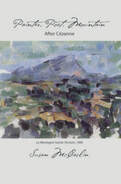
PAINTER, POET, MOUNTAIN: AFTER CÉZANNE
Quattro Books, 2016
quattrobooks.ca/books/painter-poet-mountain-after-cezanne/
ISBN: 978-1-988254-23-4
Painter, Poet, Mountain: After Cézanne re-enacts a journey to Aix-en-Provence in 2013, where the poet found herself in a “heart-soul-mind-clench” with the post-Impressionist painter Paul Cézanne. Her book traces how the artist accompanied her home to the Fraser Valley outside Fort Langley, British Columbia, where she gazed through his eyes to see afresh the trees and landscapes near her home. Readers may be surprised to discover the impact of Cézanne’s achievement on later poets, philosophers, and writers, the enormity and enduring quality of his legacy. Read as a whole, this book suggests that Cézanne was an early deep ecologist.
Blurbs:
Moving easily between her life as a pilgrim in Aix-en-Provence and Cézanne’s as a native, between her life as a poet and his as a painter, Susan McCaslin writes into the experience she inventively calls “interbeing.” The result is a multilayered exfoliation of Cubism like waves reaching shores or shores meeting waves. — E.D. Blodgett, author of Apostrophes: Woman at a Piano
Like much ekphrastic work, these Cézanne poems serve as an ars poetica, an interrogation and a celebration of the artistic process. The poems’ lively engagement creates an immediacy that arises from and transcends layers of description, interpretation, and imagination. These contemplative, often playful poems are written to and from “the field / of the inner eye / (where things commune).” — Stephanie Bolster, author of A Page from the Wonders of Life on Earth
Susan McCaslin’s restless poetic lines straddle the page like thin rope ladders across a bottomless canyon of silence, regret, wonder and longing. Cezanne’s life and work becomes a rich metaphor of multidimensional possibilities in a fraught world: “The pines / a dizzying galaxy / along the road.” -- Di Brandt, author of Walking to Mojácar
Quattro Books, 2016
quattrobooks.ca/books/painter-poet-mountain-after-cezanne/
ISBN: 978-1-988254-23-4
Painter, Poet, Mountain: After Cézanne re-enacts a journey to Aix-en-Provence in 2013, where the poet found herself in a “heart-soul-mind-clench” with the post-Impressionist painter Paul Cézanne. Her book traces how the artist accompanied her home to the Fraser Valley outside Fort Langley, British Columbia, where she gazed through his eyes to see afresh the trees and landscapes near her home. Readers may be surprised to discover the impact of Cézanne’s achievement on later poets, philosophers, and writers, the enormity and enduring quality of his legacy. Read as a whole, this book suggests that Cézanne was an early deep ecologist.
Blurbs:
Moving easily between her life as a pilgrim in Aix-en-Provence and Cézanne’s as a native, between her life as a poet and his as a painter, Susan McCaslin writes into the experience she inventively calls “interbeing.” The result is a multilayered exfoliation of Cubism like waves reaching shores or shores meeting waves. — E.D. Blodgett, author of Apostrophes: Woman at a Piano
Like much ekphrastic work, these Cézanne poems serve as an ars poetica, an interrogation and a celebration of the artistic process. The poems’ lively engagement creates an immediacy that arises from and transcends layers of description, interpretation, and imagination. These contemplative, often playful poems are written to and from “the field / of the inner eye / (where things commune).” — Stephanie Bolster, author of A Page from the Wonders of Life on Earth
Susan McCaslin’s restless poetic lines straddle the page like thin rope ladders across a bottomless canyon of silence, regret, wonder and longing. Cezanne’s life and work becomes a rich metaphor of multidimensional possibilities in a fraught world: “The pines / a dizzying galaxy / along the road.” -- Di Brandt, author of Walking to Mojácar
EFFORTFUL / effortless: after Cézanne
The Alfred Gustav Poetry Series, May 2015. Ed. David Zieroth. North Vancouver, B.C. (Chapbook)
Effortful / effortless: after Cézanne tells of a journey to Aix-en-Provence in 2013 where the poet found herself caught in a “heart-soul-mind clench” with Paul Cézanne, leaving her with the legacy of his process. It is a hand-made chapbook, beautifully designed by David Zieroth
The Alfred Gustav Poetry Series, May 2015. Ed. David Zieroth. North Vancouver, B.C. (Chapbook)
Effortful / effortless: after Cézanne tells of a journey to Aix-en-Provence in 2013 where the poet found herself caught in a “heart-soul-mind clench” with Paul Cézanne, leaving her with the legacy of his process. It is a hand-made chapbook, beautifully designed by David Zieroth

THE DISARMED HEART
The St. Thomas Poetry Series, 2014
stthomaspoetryseries.com/ordering/
The Disarmed Heart is a series of poems on the roots of violence and of peace-making.
The St. Thomas Poetry Series, 2014
stthomaspoetryseries.com/ordering/
The Disarmed Heart is a series of poems on the roots of violence and of peace-making.

DEMETER GOES SKYDIVING
University of Alberta Press, 2011
www.uap.ualberta.ca/titles/69-9780888645517-demeter-goes-skydiving
What if Demeter, the timeless fertility goddess of ancient Greek myth, slipped through a crack into the twenty-first century, shook off her ankle bracelets, corn tassels, and garlands, and began a tour of our improbable culture? Award-winning poet Susan McCaslin exercises the profound mother-daughter trauma forged in the Demeter-Persephone myth with unapologetic modernity. This sequence takes on a novel life all its own: Hades steals away the maiden into a cult/culture of distorted body image, addiction, high anxiety, and rampant consumerism. Mother Demeter must negotiate this alien world of health clubs, paparazzi, and so-called reality shows locked in spiritual winter. McCaslin's lyrics are by turns profound, hilarious, and devastating as she journeys to the heart of a mother's love for her daughter. Here is poetry that seeks ties to the past inside the present, poetry that speaks to us all.
Blurbs:
“How well this story fits our time, while keeping its numinousness. So many phrases and lines I love and say Amen. “The Muse is the parts of yourself thrown overboard”—ah yes! Goddess bless McCaslin for this tough, sharp and strong work!”
— Alicia Ostriker, author of the volcano sequence
“What an exhilarating romp through Greek mythology and the modern underworld in language both elegant and original! Demeter Goes Skydiving is a contemporary tour de force taking on disenchantment, the pillage and rape of Gaia, patriarchy and its toxic effects, warmongering, and consumerism. This collection is a dramaturgy like a Greek play, with speaking parts, choruses, and music. Individual poems soar, but it is best appreciated as a whole, a jewel with many facets.”
— James Clarke, poet, memoirist, and retired Justice of the Superior Court of Ontario
“I warmed up to these characters easily, even Hades, and was soon caught up in the narratives, in their sometimes wicked humour, in their sad and surprising turns. Many poems have a kind of double-edged voluptuousness. Demeter Goes Skydivinghandles its old material in a new way, the modern terminology adding zing to the classical allusions.”
— David Zieroth, Governor General’s Award winner for The Fly in Autumn, 2009.
University of Alberta Press, 2011
www.uap.ualberta.ca/titles/69-9780888645517-demeter-goes-skydiving
What if Demeter, the timeless fertility goddess of ancient Greek myth, slipped through a crack into the twenty-first century, shook off her ankle bracelets, corn tassels, and garlands, and began a tour of our improbable culture? Award-winning poet Susan McCaslin exercises the profound mother-daughter trauma forged in the Demeter-Persephone myth with unapologetic modernity. This sequence takes on a novel life all its own: Hades steals away the maiden into a cult/culture of distorted body image, addiction, high anxiety, and rampant consumerism. Mother Demeter must negotiate this alien world of health clubs, paparazzi, and so-called reality shows locked in spiritual winter. McCaslin's lyrics are by turns profound, hilarious, and devastating as she journeys to the heart of a mother's love for her daughter. Here is poetry that seeks ties to the past inside the present, poetry that speaks to us all.
Blurbs:
“How well this story fits our time, while keeping its numinousness. So many phrases and lines I love and say Amen. “The Muse is the parts of yourself thrown overboard”—ah yes! Goddess bless McCaslin for this tough, sharp and strong work!”
— Alicia Ostriker, author of the volcano sequence
“What an exhilarating romp through Greek mythology and the modern underworld in language both elegant and original! Demeter Goes Skydiving is a contemporary tour de force taking on disenchantment, the pillage and rape of Gaia, patriarchy and its toxic effects, warmongering, and consumerism. This collection is a dramaturgy like a Greek play, with speaking parts, choruses, and music. Individual poems soar, but it is best appreciated as a whole, a jewel with many facets.”
— James Clarke, poet, memoirist, and retired Justice of the Superior Court of Ontario
“I warmed up to these characters easily, even Hades, and was soon caught up in the narratives, in their sometimes wicked humour, in their sad and surprising turns. Many poems have a kind of double-edged voluptuousness. Demeter Goes Skydivinghandles its old material in a new way, the modern terminology adding zing to the classical allusions.”
— David Zieroth, Governor General’s Award winner for The Fly in Autumn, 2009.
PERSEPHONE TOURS THE UNDERGROUND
The Alfred Gustav Poetry Series, May 2009. Ed. David Zieroth. North Vancouver, B.C. (Chapbook)
The Alfred Gustav Poetry Series, May 2009. Ed. David Zieroth. North Vancouver, B.C. (Chapbook)
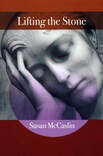
LIFTING THE STONE
Seraphim Editions, 2007
seraphimeditions.com/product/lifting-the-stone/
Lifting the Stone "is the finest collection yet by a poet with a growing reputation for writing with passionate candor and exquisite finesse on matters of faith and spirituality in the tradition of Herbert, Hopkins, and Avison." -- Seraphim Editions
Blurbs:
"Susan McCaslin hefts the everyday into the spiritual realm and interweaves this gossamer longing with the troubled, lovely tug of the quotidian. … McCaslin honours the relentless gaps in communication that often lead to transcendent forms of epiphany. Voicing the tender consciousness of St. Francis and the raucous compassion of Merton, McCaslin’s lingual spirit encompasses both “the night rotations of animals” and “the horror that is our daily bread.” Cradling the memory of parents, scripture, awe and fear, Lifting the Stone performs a delicate and difficult task of release." -- Catherine Owen
"With an equal measure of grace and grit, she sings from the still centre of being human and conscious on a glorious, defiled, everyday earth of love and pollution, dogs, moths and God. — John Terpstra
"In poems like the delicate sequence “Liturgy of Creatures,” Susan McCaslin welcomes you to her spiritual world, one that is compassionate and contemplative, and filled with “dancing highwires of verse.” — Sandy Shreve
Seraphim Editions, 2007
seraphimeditions.com/product/lifting-the-stone/
Lifting the Stone "is the finest collection yet by a poet with a growing reputation for writing with passionate candor and exquisite finesse on matters of faith and spirituality in the tradition of Herbert, Hopkins, and Avison." -- Seraphim Editions
Blurbs:
"Susan McCaslin hefts the everyday into the spiritual realm and interweaves this gossamer longing with the troubled, lovely tug of the quotidian. … McCaslin honours the relentless gaps in communication that often lead to transcendent forms of epiphany. Voicing the tender consciousness of St. Francis and the raucous compassion of Merton, McCaslin’s lingual spirit encompasses both “the night rotations of animals” and “the horror that is our daily bread.” Cradling the memory of parents, scripture, awe and fear, Lifting the Stone performs a delicate and difficult task of release." -- Catherine Owen
"With an equal measure of grace and grit, she sings from the still centre of being human and conscious on a glorious, defiled, everyday earth of love and pollution, dogs, moths and God. — John Terpstra
"In poems like the delicate sequence “Liturgy of Creatures,” Susan McCaslin welcomes you to her spiritual world, one that is compassionate and contemplative, and filled with “dancing highwires of verse.” — Sandy Shreve

A PLOT OF LIGHT
Oolichan Books, 2004
www.oolichan.com/mccaslin-a-plot-of-light
A Plot of Light charts a contemplative journey in which the world of visionary dreaming lies along a continuum with the real. The arc this volume traces is that of the everyday mystic, baffled and blessed by moments of connection with a larger, more comprehensive mind.
These poems form a quaternary. “A Breviary of Visions” is based on a series of visionary dreams, but the scaffolding of the original dreams has been removed to reveal the gem-like surface of the dreams’ essential mystery and meaning. “Transcultural Poetics: Thirteen Songs on a Merton Pilgrimage” explores the image of the dreamer as pilgrim treading the sites of poet-contemplative Thomas Merton’s birthplace in Southern France, while “Contemplation in a World of Busyness” integrates moments of transcendence into the sharper light of the everyday. The volume ends with an elegiac sequence written in 1987 about the decline and death of the poet’s father, in which the world of the dead is inseparable from the world of the living. These poems embody the longing for the birth of a new self: “How will I protect/ such a secret offspring?/ What fold will enfold/ such fragile power?”
Blurbs:
“…an authentic individual movement into the intricacies of spiritual awareness… the signature note I hear in her poems is one of tenderness, loving tenderness for the members of her family, for her teachers, for words themselves, for what is beyond words….” — Russell Thornton
“Lyrical, sorrowful, joyful and translucent, this is a book of spiritual and lyrical mastery.” — Harold Rhenisch
Oolichan Books, 2004
www.oolichan.com/mccaslin-a-plot-of-light
A Plot of Light charts a contemplative journey in which the world of visionary dreaming lies along a continuum with the real. The arc this volume traces is that of the everyday mystic, baffled and blessed by moments of connection with a larger, more comprehensive mind.
These poems form a quaternary. “A Breviary of Visions” is based on a series of visionary dreams, but the scaffolding of the original dreams has been removed to reveal the gem-like surface of the dreams’ essential mystery and meaning. “Transcultural Poetics: Thirteen Songs on a Merton Pilgrimage” explores the image of the dreamer as pilgrim treading the sites of poet-contemplative Thomas Merton’s birthplace in Southern France, while “Contemplation in a World of Busyness” integrates moments of transcendence into the sharper light of the everyday. The volume ends with an elegiac sequence written in 1987 about the decline and death of the poet’s father, in which the world of the dead is inseparable from the world of the living. These poems embody the longing for the birth of a new self: “How will I protect/ such a secret offspring?/ What fold will enfold/ such fragile power?”
Blurbs:
“…an authentic individual movement into the intricacies of spiritual awareness… the signature note I hear in her poems is one of tenderness, loving tenderness for the members of her family, for her teachers, for words themselves, for what is beyond words….” — Russell Thornton
“Lyrical, sorrowful, joyful and translucent, this is a book of spiritual and lyrical mastery.” — Harold Rhenisch
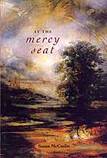
AT THE MERCY SEAT
Ronsdale Press, 2003
ronsdalepress.com/books/at-the-mercy-seat/
At the Mercy Seat explores how the relentlessness of mercy permeates the natural world, our domesticity and our relationships, and opens them to mystery. The collection is arranged in three sections entitled "The Names of Green," poems of spirit-enfolding nature; "Ob-La-Di, Ob-la-da, (Life in the Burbs)," lyric meditations on sacred eruptions in the everyday; and "Matrilineal Lines," poems of parenting and the origins of song. These various themes interweave throughout the book so that spirit and matter, the sacred and profane, the delicate and the disturbing are part of a unified field.
Whether the poems reclaim biblical stories or the voices of McCaslin's poetic progenitors, they are compelling and finely nuanced events leading to a contemplative being in the world. This is a book about thresholds: the meeting places of silence and language, suburbia and coastal wilderness, the seemingly disparate worlds of parent and child, husband and wife. The poems remind the reader that magical transformations can occur at places both "here" and "there," that we are all to some extent "threshold dwellers," that divine mercy still breaks into the middle of our most ordinary lives: "Then a sudden rupturing of the fabric --jagged edge of raw blue silk torn from its skein."
Blurbs:
"At the Mercy Seat offers a message we need listen for: 'Live like a field lily,' McCaslin urges, 'springing back.'" — Kate Braid
“What quiet in these poems, and in the quiet, what thinking appears. In the ruminative quiet, “;the face of your birth rises from your head’; in the lit quiet, Blake is speaking. Who would not want to wait for a time in this place of delighted interiority Susan McCaslin as created?” — Tim Lilburn
Ronsdale Press, 2003
ronsdalepress.com/books/at-the-mercy-seat/
At the Mercy Seat explores how the relentlessness of mercy permeates the natural world, our domesticity and our relationships, and opens them to mystery. The collection is arranged in three sections entitled "The Names of Green," poems of spirit-enfolding nature; "Ob-La-Di, Ob-la-da, (Life in the Burbs)," lyric meditations on sacred eruptions in the everyday; and "Matrilineal Lines," poems of parenting and the origins of song. These various themes interweave throughout the book so that spirit and matter, the sacred and profane, the delicate and the disturbing are part of a unified field.
Whether the poems reclaim biblical stories or the voices of McCaslin's poetic progenitors, they are compelling and finely nuanced events leading to a contemplative being in the world. This is a book about thresholds: the meeting places of silence and language, suburbia and coastal wilderness, the seemingly disparate worlds of parent and child, husband and wife. The poems remind the reader that magical transformations can occur at places both "here" and "there," that we are all to some extent "threshold dwellers," that divine mercy still breaks into the middle of our most ordinary lives: "Then a sudden rupturing of the fabric --jagged edge of raw blue silk torn from its skein."
Blurbs:
"At the Mercy Seat offers a message we need listen for: 'Live like a field lily,' McCaslin urges, 'springing back.'" — Kate Braid
“What quiet in these poems, and in the quiet, what thinking appears. In the ruminative quiet, “;the face of your birth rises from your head’; in the lit quiet, Blake is speaking. Who would not want to wait for a time in this place of delighted interiority Susan McCaslin as created?” — Tim Lilburn
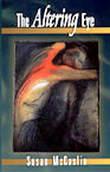
THE ALTERING EYE
Borealis Book Publishers, 2000
The Altering Eye begins as a heralding of the poet's literary mentors, William Blake, poet, visionary and artist ("Letters to William Blake") and Teresa of Avila, the sixteenth-century Spanish mystic ("The Teresa Poems"). Yet it quickly becomes apparent that the import of the conversation with her spiritual companions is an engagement in the mystical tradition as a living stream. In the last section, "Oracular Heart", the poet mixes everyday work, play and her own daring dream work into a synthesis capable of overcoming some of the dualities of contemporary life.
Borealis Book Publishers, 2000
The Altering Eye begins as a heralding of the poet's literary mentors, William Blake, poet, visionary and artist ("Letters to William Blake") and Teresa of Avila, the sixteenth-century Spanish mystic ("The Teresa Poems"). Yet it quickly becomes apparent that the import of the conversation with her spiritual companions is an engagement in the mystical tradition as a living stream. In the last section, "Oracular Heart", the poet mixes everyday work, play and her own daring dream work into a synthesis capable of overcoming some of the dualities of contemporary life.
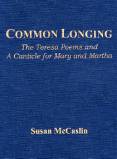
COMMON LONGING
Mellen Poetry Press, 2001
ISBN 0-7734-3424-0
Common Longing, contains “The Teresa Poems” (a monologue of seventeen poems addressing the Spanish mystic, Teresa of Avila) and “A Canticle for Mary and Martha” (a series exploring the coexistence of the active and contemplative modes of being as two facets of a single consciousness). Although this volume is out of print, “The Teresa Poems” was also published in Canada by Borealis Press as part of The Altering Eye, and “A Canticle for Mary and Martha” is contained in the volume Into the Open.
Mellen Poetry Press, 2001
ISBN 0-7734-3424-0
Common Longing, contains “The Teresa Poems” (a monologue of seventeen poems addressing the Spanish mystic, Teresa of Avila) and “A Canticle for Mary and Martha” (a series exploring the coexistence of the active and contemplative modes of being as two facets of a single consciousness). Although this volume is out of print, “The Teresa Poems” was also published in Canada by Borealis Press as part of The Altering Eye, and “A Canticle for Mary and Martha” is contained in the volume Into the Open.
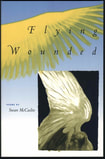
FLYING WOUNDED
The University of Florida Press, 2000
Flying Wounded is a daring exploration of the disturbance wreaked on a daughter by her mother's ill-treated, then untreated, mental illness and of the daughter's almost miraculous transformation. The first half of the book charts the decline of the mother, "a boisterous southern woman of voluminous laughter" who finds herself "incarcerated in an inquisitional tower." The tower is both the asylum (a university hospital) and, later, her own phobic existence as a "mall bag lady."
In her preface, McCaslin makes the point that, because the sixties was a time of drug-prescribed treatment for the mentally ill, her mother was probably one of legions of "hysterical women" used as guinea pigs. This should, then, be a gloomy book. But the energy of the language McCaslin uses to describe the day-to-day battles of the protagonists infuses it with wit, love, and something like grim hilarity. With amazing objectivity and delicacy of language, McCaslin transforms pain--here and in so many of her poems--into the beauty of art.
Blurbs:
“When those of us who fly wounded wing our way with one another—lo!—we are a flock, birds of a feather, made safe, made joyous even, in our onward way.” -- Joy Kogawa
“Surrounded by falling stars and pieces of broken heart, Flying Wounded flies straight into the eye of madness. The book is a striking portrait of the ignorance of earlier times, and of a mother/daughter relationship that is part nightmare, part legacy. In language sometimes lyrical, sometimes straightforward as a shriek, Susan McCaslin writes about the tangled darkness of mental illness with great courage and resolve.” -- Barry Dempster
The University of Florida Press, 2000
Flying Wounded is a daring exploration of the disturbance wreaked on a daughter by her mother's ill-treated, then untreated, mental illness and of the daughter's almost miraculous transformation. The first half of the book charts the decline of the mother, "a boisterous southern woman of voluminous laughter" who finds herself "incarcerated in an inquisitional tower." The tower is both the asylum (a university hospital) and, later, her own phobic existence as a "mall bag lady."
In her preface, McCaslin makes the point that, because the sixties was a time of drug-prescribed treatment for the mentally ill, her mother was probably one of legions of "hysterical women" used as guinea pigs. This should, then, be a gloomy book. But the energy of the language McCaslin uses to describe the day-to-day battles of the protagonists infuses it with wit, love, and something like grim hilarity. With amazing objectivity and delicacy of language, McCaslin transforms pain--here and in so many of her poems--into the beauty of art.
Blurbs:
“When those of us who fly wounded wing our way with one another—lo!—we are a flock, birds of a feather, made safe, made joyous even, in our onward way.” -- Joy Kogawa
“Surrounded by falling stars and pieces of broken heart, Flying Wounded flies straight into the eye of madness. The book is a striking portrait of the ignorance of earlier times, and of a mother/daughter relationship that is part nightmare, part legacy. In language sometimes lyrical, sometimes straightforward as a shriek, Susan McCaslin writes about the tangled darkness of mental illness with great courage and resolve.” -- Barry Dempster

INTO THE OPEN
Golden Eagle Press, 1999
This 151-page volume of poems, self-published, contains three sections:
“Into the Open” (an phenomenological exploration of the Muse),
“Liberation: a Gospel Retold” (a radical revisioning of incidents from the Gospel of John ), and
“A Canticle for Mary and Martha” (a poetic inquiry into the relation of contemplation and action).
Golden Eagle Press, 1999
This 151-page volume of poems, self-published, contains three sections:
“Into the Open” (an phenomenological exploration of the Muse),
“Liberation: a Gospel Retold” (a radical revisioning of incidents from the Gospel of John ), and
“A Canticle for Mary and Martha” (a poetic inquiry into the relation of contemplation and action).

ORACULAR HEART
Hawthorne Society, Reference West, 1999
ISBN 1-894010-36
A chapbook of twenty poems based on visionary dreams.
Hawthorne Society, Reference West, 1999
ISBN 1-894010-36
A chapbook of twenty poems based on visionary dreams.
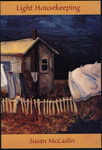
LIGHT HOUSEKEEPING
Ekstasis Editions, 1997
"Nobody writes anymore about the soul...," yet these poems about pregnancy, a newborn, and suburban motherhood are suffused with a numinous iridescence. But this should is not "a lavender-scented antique doily." It touches the obduracy of toddlers, inconsolable sadness, and the dreariness of day-to-day domestics.
These poems resonate with Blake, the Rhine and Spanish mystics, Dickinson, and yet have a palette all their own. There is also the tense honesty of being a poem-maker in a time and place when the poem portal is closed. Thankfully “The angels returned” to give us poems which may help us when “we reach the end of time and flesh.” Susan McCaslin is an accomplished poet, and the receptive reader will discover some personal portals opening. — Hannah J. Main-Van der Kamp
Ekstasis Editions, 1997
"Nobody writes anymore about the soul...," yet these poems about pregnancy, a newborn, and suburban motherhood are suffused with a numinous iridescence. But this should is not "a lavender-scented antique doily." It touches the obduracy of toddlers, inconsolable sadness, and the dreariness of day-to-day domestics.
These poems resonate with Blake, the Rhine and Spanish mystics, Dickinson, and yet have a palette all their own. There is also the tense honesty of being a poem-maker in a time and place when the poem portal is closed. Thankfully “The angels returned” to give us poems which may help us when “we reach the end of time and flesh.” Susan McCaslin is an accomplished poet, and the receptive reader will discover some personal portals opening. — Hannah J. Main-Van der Kamp
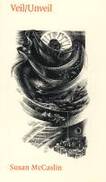
VEIL / UNVEIL
The St. Thomas Poetry Series, 1997
stthomaspoetryseries.com/ordering/
Veil/Unveil consists of thirty-six lyric meditations on the theme of the continuous “veiling” and “unveiling” of ultimate reality in moments of time. It is one in a series of poetry books published by The St. Thomas Poetry Series, which has its origin in the poetry readings held annually since 1988 at St. Thomas’s Church on Huron Street in Toronto. According to publisher David A. Kent, most of the poets in this series have participated in those readings, and all share a perspective on human life that emphasizes its metaphysical and philosophical dimensions. Their poems witness to the religious meaning of experience.
The St. Thomas Poetry Series, 1997
stthomaspoetryseries.com/ordering/
Veil/Unveil consists of thirty-six lyric meditations on the theme of the continuous “veiling” and “unveiling” of ultimate reality in moments of time. It is one in a series of poetry books published by The St. Thomas Poetry Series, which has its origin in the poetry readings held annually since 1988 at St. Thomas’s Church on Huron Street in Toronto. According to publisher David A. Kent, most of the poets in this series have participated in those readings, and all share a perspective on human life that emphasizes its metaphysical and philosophical dimensions. Their poems witness to the religious meaning of experience.
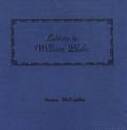
LETTERS TO WILLIAM BLAKE
Mother Tongue Press, 1997
(hand set press collector's edition)
ISBN: 1-896949-00-2
"In one of fifteen short letters to William Blake, McCaslin asks, "What happens to the reconstructive Imagination after a hundred replays of "I Love Lucy"...? A good question. And one central to this series of remarkable poems about modern life and its dilemmas. While not above giving Blake the odd dig, McCaslin's tone is both familiar and respectful, and her final words to him are "keep me informed through the sieve of your eye. Indeed!" — P.K. Page
Mother Tongue Press, 1997
(hand set press collector's edition)
ISBN: 1-896949-00-2
"In one of fifteen short letters to William Blake, McCaslin asks, "What happens to the reconstructive Imagination after a hundred replays of "I Love Lucy"...? A good question. And one central to this series of remarkable poems about modern life and its dilemmas. While not above giving Blake the odd dig, McCaslin's tone is both familiar and respectful, and her final words to him are "keep me informed through the sieve of your eye. Indeed!" — P.K. Page

LOCUTIONS
Ekstasis Editions, 1995
Optimistic, enigmatic, erotic and spiritual, Locutions is divided into three parts which progressively unify the intellect, the heart and the body. The first part concerns archetypal female wisdom; the second, aspects of the Divine Body; and the third, the angel as a sacred presence in the world.
Ekstasis Editions, 1995
Optimistic, enigmatic, erotic and spiritual, Locutions is divided into three parts which progressively unify the intellect, the heart and the body. The first part concerns archetypal female wisdom; the second, aspects of the Divine Body; and the third, the angel as a sacred presence in the world.
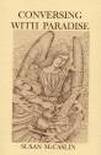
CONVERSING WITH PARADISE
Golden Eagle Press, 1986
Conversing with Paradise, self-published, contains two sections: “Conversing with Paradise” and “From a Foursquare Prison.” The first section is a series of forty lyric poems on spiritual themes, while the second section explores the figures of poets and visionaries such as John of Patmos, Boethius, John of the Cross, Robert Southwell, John Bunyan, Oscar Wilde, and Ezra Pound, who wrote poems from prison.
Golden Eagle Press, 1986
Conversing with Paradise, self-published, contains two sections: “Conversing with Paradise” and “From a Foursquare Prison.” The first section is a series of forty lyric poems on spiritual themes, while the second section explores the figures of poets and visionaries such as John of Patmos, Boethius, John of the Cross, Robert Southwell, John Bunyan, Oscar Wilde, and Ezra Pound, who wrote poems from prison.
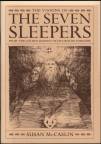
VISIONS OF THE SEVEN SLEEPERS
from “the Golden Legend” of Jacobus de Voragine
Iona Press, 1979
This chapbook contains seven long poems based on the hypothetical dreams of the Seven Sleepers of Medieval legend during their one hundred-year-long sleep in a cave. The Vision of the Seven Sleepers was produced on a handset press. Cover design and typography are by Ian E. Staunton; printed on deluxe wove paper, on a Challenge Gordon platen press.
from “the Golden Legend” of Jacobus de Voragine
Iona Press, 1979
This chapbook contains seven long poems based on the hypothetical dreams of the Seven Sleepers of Medieval legend during their one hundred-year-long sleep in a cave. The Vision of the Seven Sleepers was produced on a handset press. Cover design and typography are by Ian E. Staunton; printed on deluxe wove paper, on a Challenge Gordon platen press.

MOTIONS OF THE HEARTS
self-published chapbook
self-published chapbook

KINDLING
Arion Press, 1979
self-published chapbook
Arion Press, 1979
self-published chapbook

